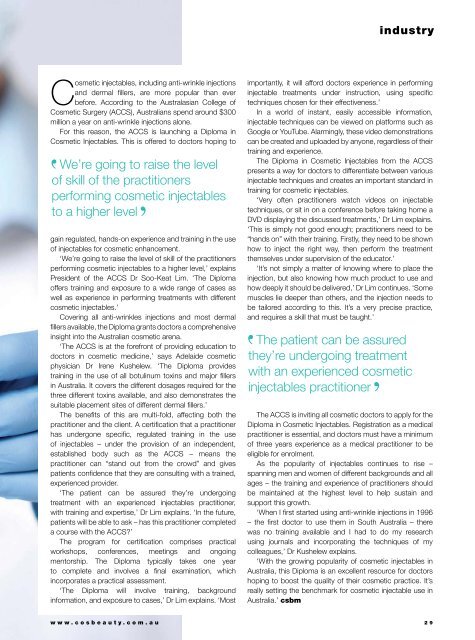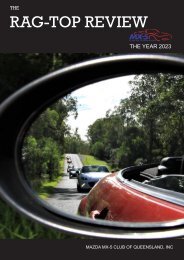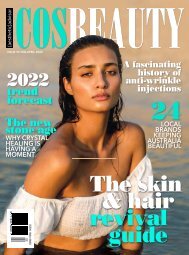Cosmetic Surgery and Beauty Magazine #67
Cosmetic Surgery and Beauty is the go-to magazine for anyone considering an aesthetic procedure. Covering a huge range of treatments with in-depth expert interviews and hundreds of before and after photos.
Cosmetic Surgery and Beauty is the go-to magazine for anyone considering an aesthetic procedure. Covering a huge range of treatments with in-depth expert interviews and hundreds of before and after photos.
You also want an ePaper? Increase the reach of your titles
YUMPU automatically turns print PDFs into web optimized ePapers that Google loves.
industry<br />
<strong>Cosmetic</strong> injectables, including anti-wrinkle injections<br />
<strong>and</strong> dermal fillers, are more popular than ever<br />
before. According to the Australasian College of<br />
<strong>Cosmetic</strong> <strong>Surgery</strong> (ACCS), Australians spend around $300<br />
million a year on anti-wrinkle injections alone.<br />
For this reason, the ACCS is launching a Diploma in<br />
<strong>Cosmetic</strong> Injectables. This is offered to doctors hoping to<br />
We’re going to raise the level<br />
of skill of the practitioners<br />
performing cosmetic injectables<br />
to a higher level<br />
gain regulated, h<strong>and</strong>s-on experience <strong>and</strong> training in the use<br />
of injectables for cosmetic enhancement.<br />
‘We’re going to raise the level of skill of the practitioners<br />
performing cosmetic injectables to a higher level,’ explains<br />
President of the ACCS Dr Soo-Keat Lim. ‘The Diploma<br />
offers training <strong>and</strong> exposure to a wide range of cases as<br />
well as experience in performing treatments with different<br />
cosmetic injectables.’<br />
Covering all anti-wrinkles injections <strong>and</strong> most dermal<br />
fillers available, the Diploma grants doctors a comprehensive<br />
insight into the Australian cosmetic arena.<br />
‘The ACCS is at the forefront of providing education to<br />
doctors in cosmetic medicine,’ says Adelaide cosmetic<br />
physician Dr Irene Kushelew. ‘The Diploma provides<br />
training in the use of all botulinum toxins <strong>and</strong> major fillers<br />
in Australia. It covers the different dosages required for the<br />
three different toxins available, <strong>and</strong> also demonstrates the<br />
suitable placement sites of different dermal fillers.’<br />
The benefits of this are multi-fold, affecting both the<br />
practitioner <strong>and</strong> the client. A certification that a practitioner<br />
has undergone specific, regulated training in the use<br />
of injectables – under the provision of an independent,<br />
established body such as the ACCS – means the<br />
practitioner can “st<strong>and</strong> out from the crowd” <strong>and</strong> gives<br />
patients confidence that they are consulting with a trained,<br />
experienced provider.<br />
‘The patient can be assured they’re undergoing<br />
treatment with an experienced injectables practitioner,<br />
with training <strong>and</strong> expertise,’ Dr Lim explains. ‘In the future,<br />
patients will be able to ask – has this practitioner completed<br />
a course with the ACCS?’<br />
The program for certification comprises practical<br />
workshops, conferences, meetings <strong>and</strong> ongoing<br />
mentorship. The Diploma typically takes one year<br />
to complete <strong>and</strong> involves a final examination, which<br />
incorporates a practical assessment.<br />
‘The Diploma will involve training, background<br />
information, <strong>and</strong> exposure to cases,’ Dr Lim explains. ‘Most<br />
importantly, it will afford doctors experience in performing<br />
injectable treatments under instruction, using specific<br />
techniques chosen for their effectiveness.’<br />
In a world of instant, easily accessible information,<br />
injectable techniques can be viewed on platforms such as<br />
Google or YouTube. Alarmingly, these video demonstrations<br />
can be created <strong>and</strong> uploaded by anyone, regardless of their<br />
training <strong>and</strong> experience.<br />
The Diploma in <strong>Cosmetic</strong> Injectables from the ACCS<br />
presents a way for doctors to differentiate between various<br />
injectable techniques <strong>and</strong> creates an important st<strong>and</strong>ard in<br />
training for cosmetic injectables.<br />
‘Very often practitioners watch videos on injectable<br />
techniques, or sit in on a conference before taking home a<br />
DVD displaying the discussed treatments,’ Dr Lim explains.<br />
‘This is simply not good enough; practitioners need to be<br />
“h<strong>and</strong>s on” with their training. Firstly, they need to be shown<br />
how to inject the right way, then perform the treatment<br />
themselves under supervision of the educator.’<br />
‘It’s not simply a matter of knowing where to place the<br />
injection, but also knowing how much product to use <strong>and</strong><br />
how deeply it should be delivered,’ Dr Lim continues. ‘Some<br />
muscles lie deeper than others, <strong>and</strong> the injection needs to<br />
be tailored according to this. It’s a very precise practice,<br />
<strong>and</strong> requires a skill that must be taught.’<br />
The patient can be assured<br />
they’re undergoing treatment<br />
with an experienced cosmetic<br />
injectables practitioner<br />
The ACCS is inviting all cosmetic doctors to apply for the<br />
Diploma in <strong>Cosmetic</strong> Injectables. Registration as a medical<br />
practitioner is essential, <strong>and</strong> doctors must have a minimum<br />
of three years experience as a medical practitioner to be<br />
eligible for enrolment.<br />
As the popularity of injectables continues to rise –<br />
spanning men <strong>and</strong> women of different backgrounds <strong>and</strong> all<br />
ages – the training <strong>and</strong> experience of practitioners should<br />
be maintained at the highest level to help sustain <strong>and</strong><br />
support this growth.<br />
‘When I first started using anti-wrinkle injections in 1996<br />
– the first doctor to use them in South Australia – there<br />
was no training available <strong>and</strong> I had to do my research<br />
using journals <strong>and</strong> incorporating the techniques of my<br />
colleagues,’ Dr Kushelew explains.<br />
‘With the growing popularity of cosmetic injectables in<br />
Australia, this Diploma is an excellent resource for doctors<br />
hoping to boost the quality of their cosmetic practice. It’s<br />
really setting the benchmark for cosmetic injectable use in<br />
Australia.’ csbm<br />
www.cosbeauty.com.au 29


















